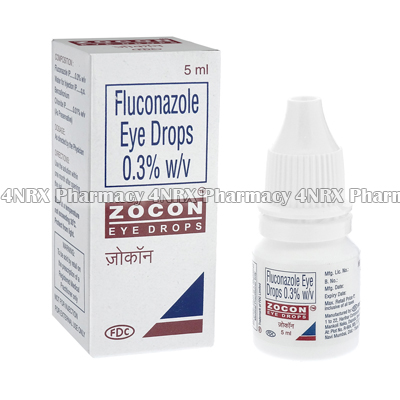 |
Home  Eyes Eyes  Zocon Eye Drops (Fluconazole) Zocon Eye Drops (Fluconazole) |
|
|||||||||
|
|
Zocon Eye Drops (Fluconazole)
What is Zocon Eye Drops (Fluconazole) used for? Zocon Eye Drops (Fluconazole) is an ophthalmic antibiotic used to treat patients suffering from bacterial infections affecting the eye. When used correctly, it can relieve symptoms such as irritation, swelling, or crusting of the eye. The medication operates by preventing the reproduction of bacterial cells allowing the immune system to destroy them naturally. Your physician may also prescribe it to treat other conditions that are not listed here. How should I use Zocon Eye Drops (Fluconazole)? Always follow your physician's instructions for using Zocon Eye Drops (Fluconazole) to get the most effective results. It is typically applied once or twice each day, but your particular regimen will be determined by the severity of your symptoms. To administer the drops, tilt your head back and gently pull down the lower eyelid. Dispense one drop into the pouch formed, slowly close the eye, and keep it closed for thirty seconds to allow the medication to be absorbed. Never let the tip of the bottle touch any foreign surfaces, including the eye itself, as this may contaminate the solution. If you have any questions about administering the drops, ask your pharmacist or physician to ensure the correct usage. What are the side effects of Zocon Eye Drops (Fluconazole)? Some patients have reported experiencing side effects while using Zocon Eye Drops (Fluconazole) such as:
Immediately inform your doctor if you experience skin reactions, seizures, swelling, or faintness as these conditions may require emergency medical attention or changes to your regimen to prevent further problems from occurring. Please Note Strictly follow all instructions provided to you by your physician or pharmacist while using Zocon Eye Drops (Fluconazole). Optimum and safe dosage can differ based on the patient and the condition being treated. As this medication may be unsafe for certain patients, it is essential you always inform your physician if you are pregnant or breastfeeding, as well as if you have any allergies, other illnesses, or ongoing health conditions, and if you are taking any other form of medication, supplements, or herbal products. Immediately seek emergency medical care if you have an allergic or hypersensitive reaction. Common signs of a reaction include hives, swelling, skin rashes, chest pains, as well as trouble breathing or swallowing. 
|
||||||||||||||||||||||